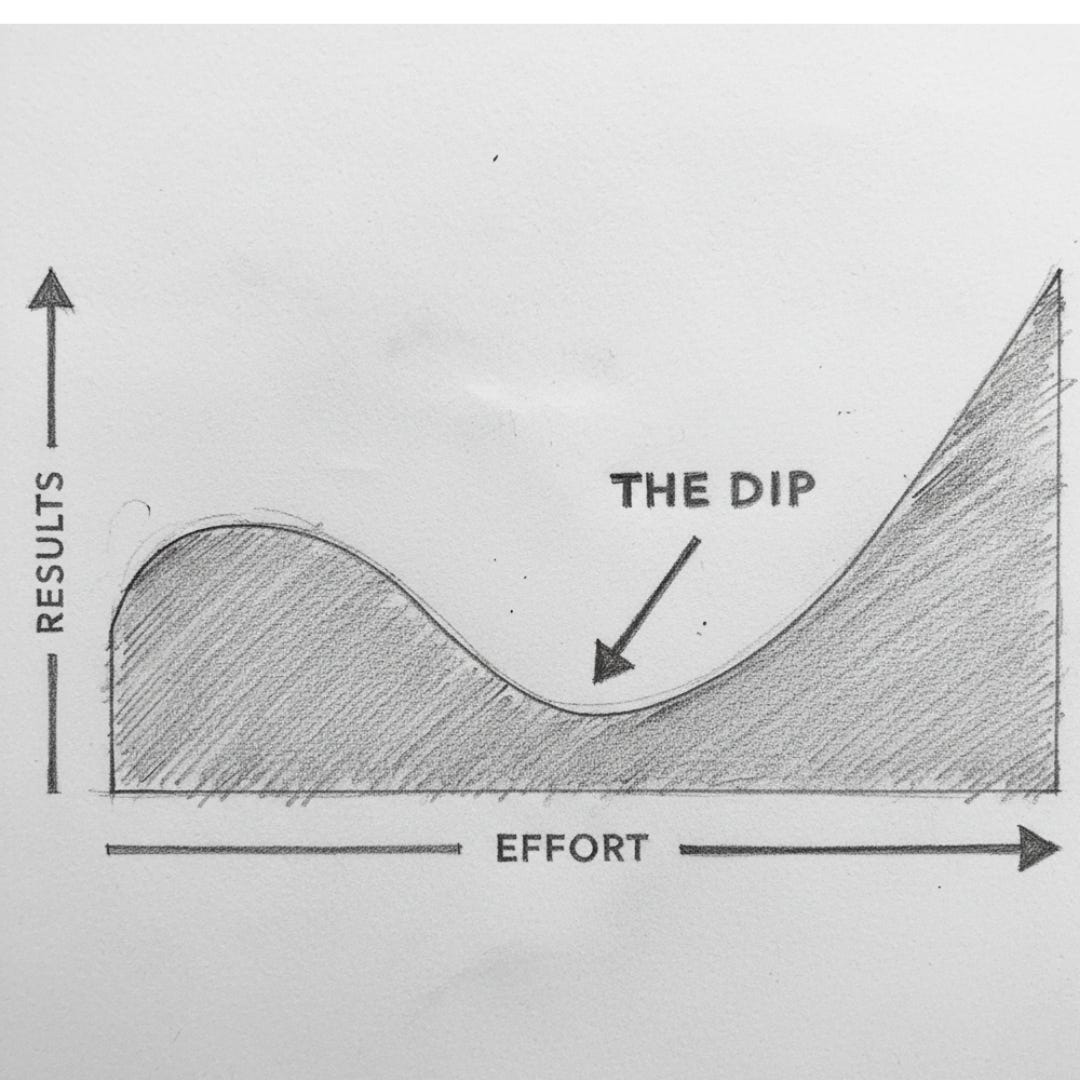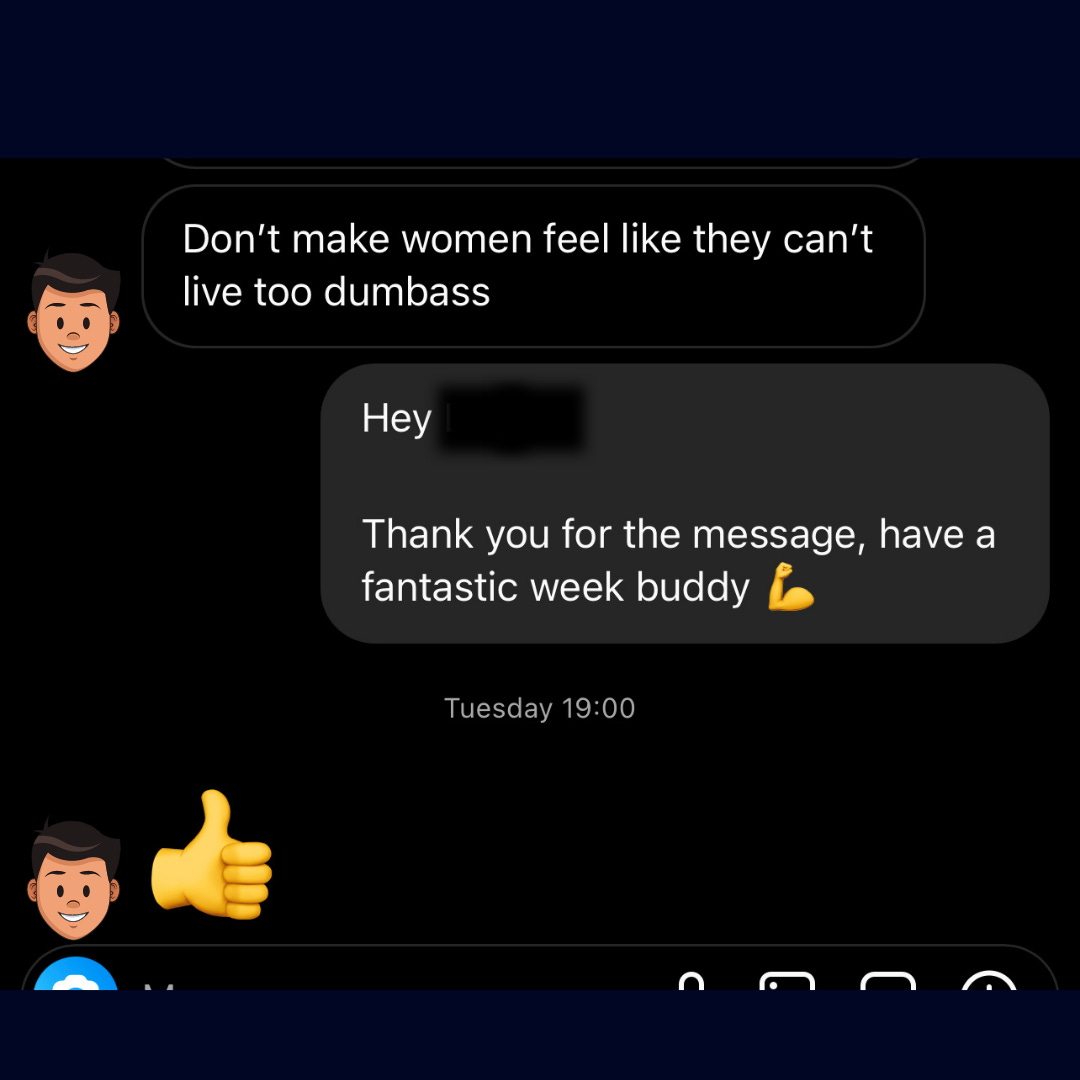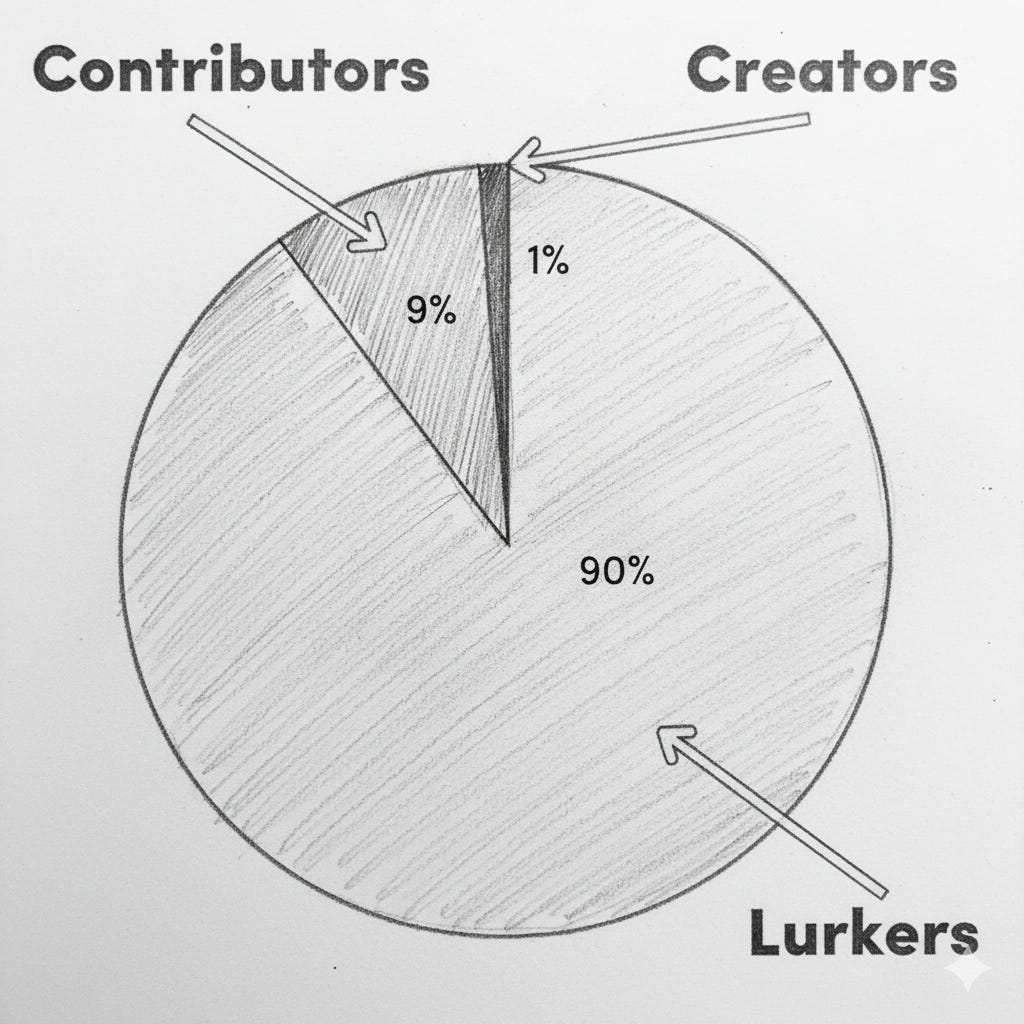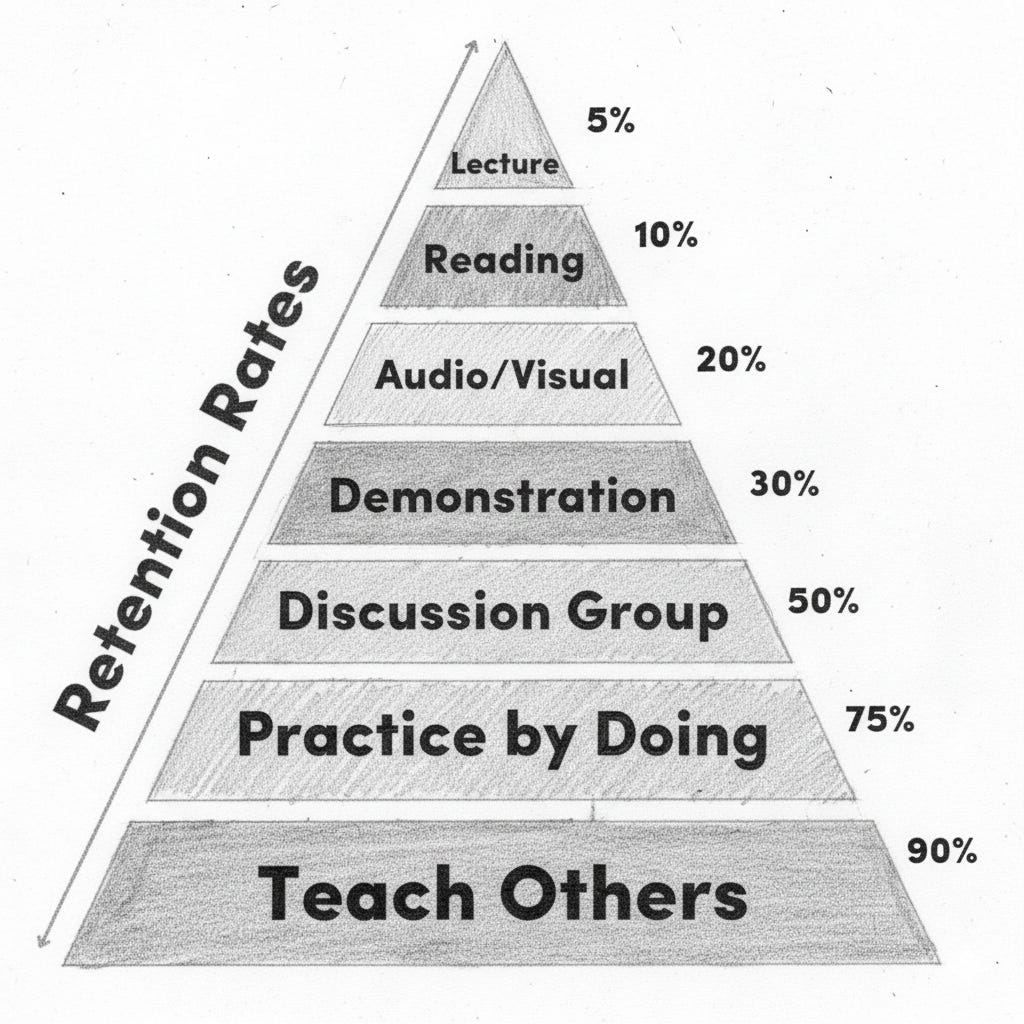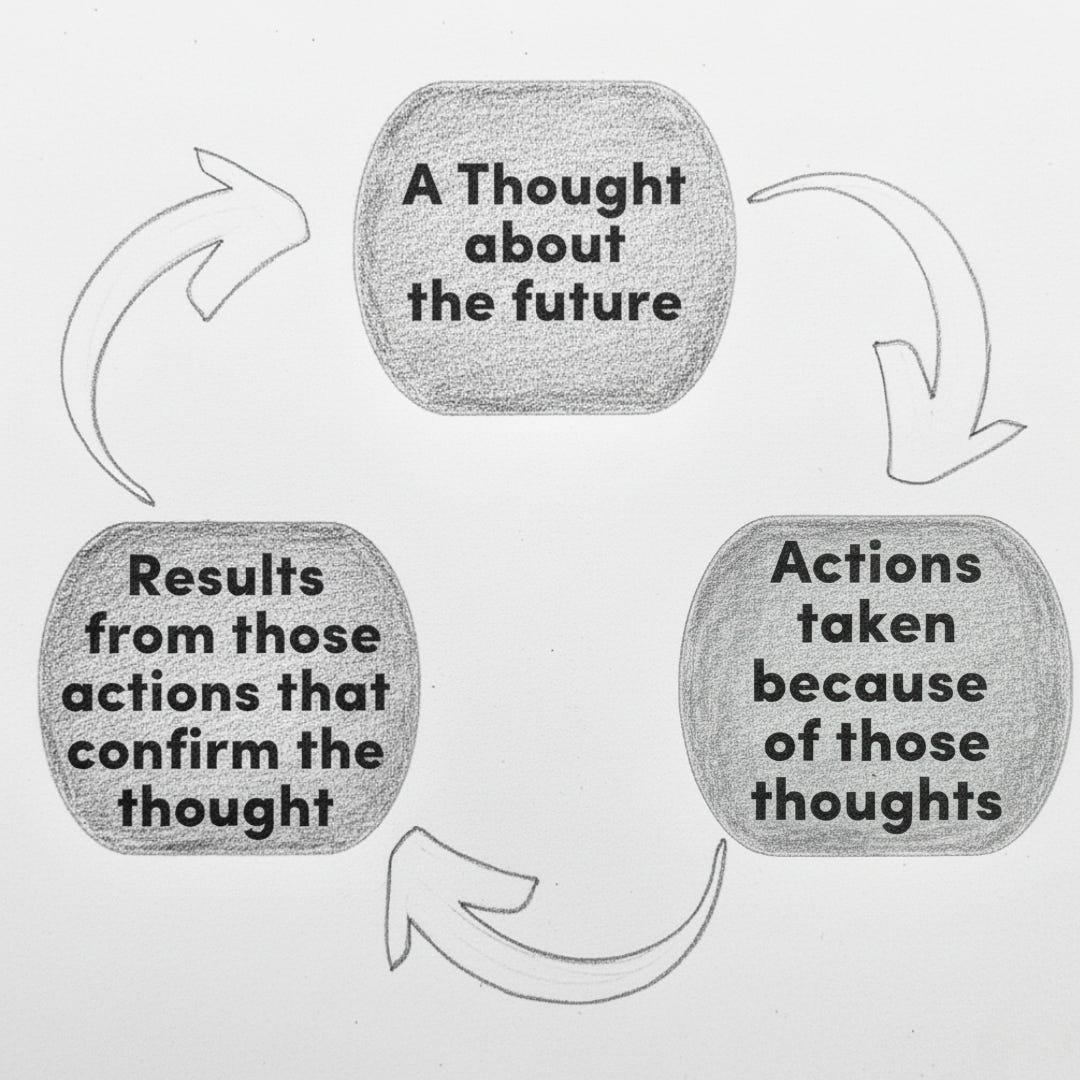Today, I’m going to go through 8 life principles that have really helped me up my game over the last few years.
What is a life principle?
A life principle is a fundamental guideline or belief that someone follows in order to live a fulfilling life.
These principles can be personal or universal, and they often reflect an individual’s values and goals.
Life principles, to me, are mental models that you can take with you and use in everyday life.
Take a look at my 8 and let me know which ones resonate with you the most.
Let’s go...
#1 - Embrace “The Dip”
“The Dip” is a fantastic book by Seth Godin.
In it, he discusses the idea that to be successful in any area of life, you need to be willing to endure the difficult and challenging times that inevitably come with it.
Here’s the problem…
People give up too easily when they reach a “dip”
(a period of time when progress seems slow or non-existent).
Those who are willing to push through the dip will eventually come out the other side and reap the rewards of their hard work and persistence.
So the next time a project or task you’re super focused on starts to feel like it’s going backwards, keep pushing forwards.
Incredible things start to happen once you’re out of the dip.
Most people quit right before the breakthrough.
Don’t be most people!
#2 - Master “The Gap”
“Between stimulus and response there is a space. In that space is our power to choose our response. In our response lies our growth and our freedom.” - Viktor E. Frankl
The Gap is a magical period of time between when something happens to you and how you respond.
A great example?
You post something online, and someone says something nasty in the comments.
Your immediate reaction is to get angry and “fight fire with fire” by giving them just as much nastiness in a response.
Before you do, pause for a second and breathe.
Don’t think…
“What’s the wittiest response I can think of right now to get one up on them?”
Think…
“That person might just be having a bad day, and their response has nothing to do with me and everything to do with them.”
Another one I think about is this…
“Do I really want to waste my time arguing with a stranger on the internet when I could be spending that time doing something productive?”
The answer is always no.
The best response?
Wish them well and end it there.
Most of the time when this happens, that’s the end of the conversation, and no more time has been wasted.
“Do not continue the battle. One may think they have won because you chose silence. But the true winner is the one with peace in their heart.” - Anon
#3 - Don’t Complain, Don’t Explain
This motto was heavily associated with Queen Elizabeth II, who reigned for over 70 years on the throne in the United Kingdom and the Commonwealth.
As you can imagine, during her 70-year reign, she had to endure ups and downs that tested her patience and resolve.
Did you see any of this during her reign?
No.
Here’s what happens…
When bad things happen to us or we make mistakes, we feel the world’s eyes are on us and that people are pressuring us to “make a response” or “justify what we meant.”
It’s during these times that people make their biggest slip-ups, saying things they don’t really mean because they feel vulnerable and weak.
This does not help you in the long run, and all those people who you think are attacking you right now will move on to something else in a couple of days.
The “Don’t Complain, Don’t Explain” motto encourages a mindset of positivity and productivity, rather than dwelling on negative aspects or making excuses for one’s actions.
If you’re unhappy about something or someone and you can’t do anything about it, then don’t complain.
If you know deep down the things you meant and how true you’ve been to your decisions, then don’t explain.
#4 - Create More Than You Consume
The internet is split into three types of people:
90% are Lurkers - These are people who consume 100% of everything on the internet but never create anything themselves
9% are Contributors - These are people who contribute a little bit to the internet (the odd blog post or article) but still spend more time consuming than creating
1% are Creators - These are people who spend pretty much all their time creating value content for the other 99% of the world that consume it
This is called the 90-9-1 Principle, and I’ve found it applies to pretty much anything.
If I teach a room of 200 people, 180 won’t do anything with the information, 18 will do something, and 2 will do everything.
If you want to make sure you’re in that top 10%, then focus on creating more than you consume.
Creating online will have a significant impact on your life when done consistently and will give you opportunities you never dreamed of, as it has for me.
Stop lurking. Start creating!
#5 - Learn Then Teach
There’s something called the Learning Retention Pyramid.
Although it’s just a theory, the majority of it is true.
There is a massive difference in how much information you retain when you compare sitting in a classroom learning to practising by doing.
You can learn how to run a business from someone else, or you can start a business and learn as you go.
The game changes, however, when you start to teach others what you’ve learned.
To teach others, you really need to understand what you’re talking about, so you retain the information better.
And I find this is super important to do when it comes to reading.
Here’s what I want you to do the next time you read a chapter of a book:
Read the chapter of the book
Write down three of the biggest takeaways from the chapter
Write a post online about your three biggest takeaways from the chapter, or sit down with a friend and tell them about the three things you’ve learned.
You’ll be amazed at just how much the information goes in and stays there when you do.
#6 - Focus on Fun
When we’re stressed, it can trigger addictive behaviour.
Binge-watching Netflix.
Eating all the food in the cupboard.
Taking drugs and drinking alcohol.
We’re doing this to reduce stress levels, and all the above do a bloody good job of doing that.
Except it doesn’t.
Although it relieves the stress temporarily, the long-term effects of abusing the above can shorten your lifespan and create unhealthy habits that limit your success and growth.
The solution?
Have more fun.
Many things having fun does to your body and brain when you participate in it regularly…
Relieves Stress - Having fun releases endorphins, the body’s natural feel-good chemical. Endorphins give you an overall sense of well-being and can temporarily relieve pain.
Improves Brain Function - Pursuing fun and challenging activities with others can help prevent memory problems and improve brain function. Having fun with others can help reduce stress and lower feelings of depression.
Boosts Creativity - You learn better when you’re relaxed and in a playful mood. Having fun stimulates imagination, which helps you solve problems more easily.
Improves Connections with Others - Having fun with others can help bring empathy, trust, and intimacy and help you loosen up in stressful situations, especially when meeting new people.
Stop treating fun like it’s optional…
It’s essential!
#7 - Thoughts Become Things
A self-fulfilling prophecy is a belief or expectation that influences a person’s behaviour, ultimately leading it to come true.
For example, if someone believes they will fail at a task, they may put in less effort or become discouraged more easily, ultimately leading to failure.
In this way, their belief becomes a reality, fulfilling the prophecy they had made for themselves.
Your thoughts become things, which is why it’s vital to focus on daily mindfulness.
Mindfulness is the practice of being present and fully engaged in the current moment, without judgment or distraction.
It involves paying attention to your thoughts, emotions, and physical sensations in a non-judgmental way, to increase self-awareness and improve overall well-being.
Adding a daily mindfulness practice into your day will help stop your thoughts from becoming self-fulfilling prophecies.
#8 - Overcome Obstacles
“The obstacles that lie between you and your goals are not there to stop you from reaching your goals. They are there to stop the people who don’t want them enough.” - Randy Pausch
Throughout your life, you will face many obstacles, and when viewed the wrong way, they will hinder your progress.
What you have to understand about obstacles is that they’re not there to stop you from achieving things…
They are put in place to see how much you really want something.
Enjoy the obstacles and remember:
“You don’t learn anything from a perfect week.”
Life principles aren’t mystical concepts…
They’re practical mental models you can use every single day.
Stop doing this:
Quitting when you hit the dip
Reacting immediately without finding the gap
Complaining and explaining when things go wrong
Consuming more than you create
Learning without teaching
Treating fun as optional
Letting negative thoughts control your reality
Seeing obstacles as roadblocks
Start doing this:
Push through the dip - the breakthrough is on the other side
Master the gap between stimulus and response
Don’t complain, don’t explain - just move forward
Create more than you consume - be in the 1%
Learn then teach - retention skyrockets when you explain it to others
Focus on fun - it’s not a luxury, it’s essential
Control your thoughts before they become things
Overcome obstacles - they’re testing how much you want it
These aren’t “nice ideas.”
They’re principles that will fundamentally change how you operate if you actually apply them.
Jay Alderton


